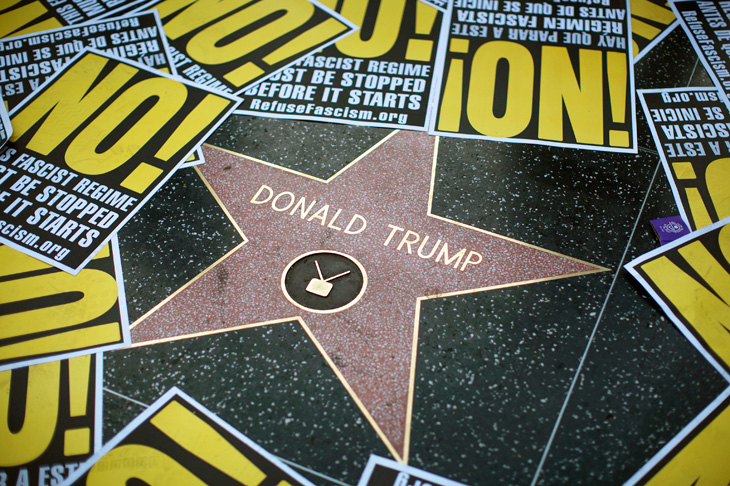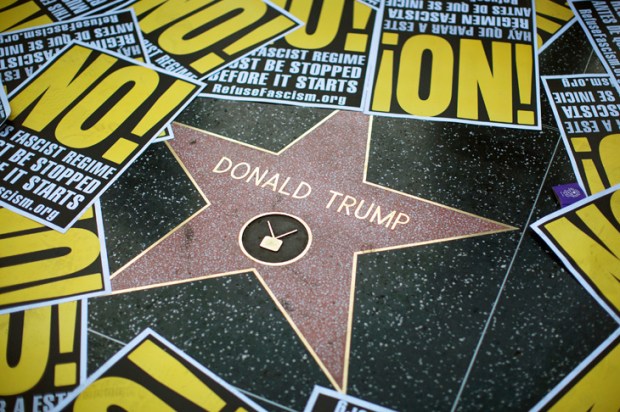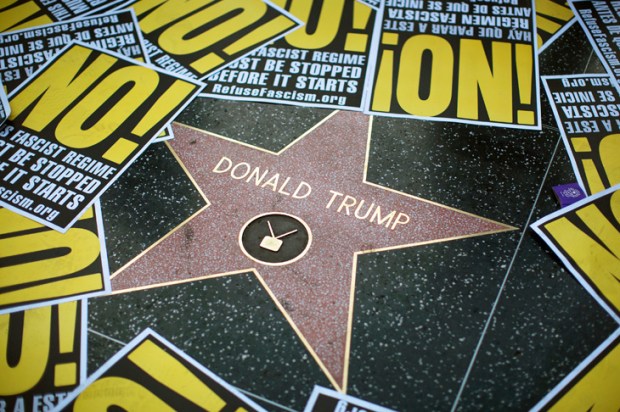The ongoing war between Donald Trump and the Hollywood A-list has entered a new and unpredictable phase. Celebrity criticism of Trump — keenly anticipated as the chewy takeaway from last week’s Academy Awards ceremony — was instead overshadowed by a celebrity cock-up. Thanks to a mix-up of the sacred envelopes, presenters Warren Beatty and Faye Dunaway temporarily awarded Best Picture to La La Land, rather than the real winner, Moonlight. The result was an unforgettable tableau of confusion at the ceremony’s crowning moment.
Trump had earlier let it be known that he wasn’t watching. Like a kid talking too loudly about his maths project while the others are getting ready for the school prom, he had tweeted: ‘Big dinner with Governors tonight at White House. Much to be discussed, including healthcare.’ I would be astonished, however, if he didn’t play the La La Land misfire on repeat later on, relishing in particular the uneasy eyes and frozen smile of Beatty, Hollywood’s famously libidinous leftie old lion.
No US president has been as fascinated by showbiz as Trump, or as infuriated by it. In the past he has regularly live-tweeted the Oscars: its mingling of pageant and competition mesmerised him and made him cross. In 2015, back in the Obama days, he tweeted: ‘The Oscars are a sad joke, very much like our President. So many things are wrong!’ In 2014 he proposed ‘Trump as host’ to shake things up, a wistfully recurrent theme. In 2013 he remarked: ‘I don’t like the opening even a little bit!’ Although Trump has 22 film and television acting credits in projects such as Home Alone 2, almost invariably playing himself, Hollywood never seriously returned his attention. Well, it has now.
Although the rumblings of thespian discontent were first heard when the cast of the musical Hamilton challenged Vice-President Mike Pence in November, Hollywood’s official attack on Trump was launched by Meryl Streep at the Golden Globes back in January. Streep took Trump to task for appearing to mock a disabled reporter, warning that ‘when the powerful use their position to bully others, we all lose’. The Donald took his cod-liver oil badly, dubbing Streep a ‘Hillary flunky who lost big’ and ‘one of the most overrated actresses in Hollywood’.
At the Oscars, it was time for the industry to return the medicine. The host Jimmy Kimmel did a mock-roast of Streep, jokingly echoing Trump’s description of her as ‘overrated’ while listing her string of dramatic triumphs, ending in a standing ovation from an adoring crowd. Hollywood — with the possible exceptions of Jon Voight and Mel Gibson, the star who fell from grace after delivering a drunken anti-Semitic rant and calling a policewoman ‘sugar tits’ while under arrest — rallied behind its woman.
But fewer Americans were listening. Ratings slid to a nine-year low: not disastrous, but dented. Some Trump supporters had led a Twitter #boycotttheoscars campaign beforehand, saying things like ‘Call out to all Deplorables!’ and ‘Tired of Political Rants’. Governor Mike Huckabee, who backed Trump for president, tweeted: ‘Watch celebs spew ignorant venom at Oscars?? Nah…think I’d rather have a colonoscopy.’ A frequently expressed view was that over-privileged ‘liberal snowflakes’ who dressed up for a living should cease lecturing ordinary folk on politics. When the ratings trickled in, the lowest were in Trump-supporting states. But the anticipated politicisation of the ceremony seemed to trigger ennui even among those who weren’t Trump fans: in below-the-line posts on Oscars articles, many such people said they were switching off.
A touch of that weariness seemed to have crept into the ceremony’s Trump protest itself. The Academy had signalled its resistance to Trump’s worldview by the very films it celebrated, which were unlikely to send the President rushing to the White House screening room: Moonlight, about a gay black boy growing up in poverty in Miami; The Salesman, by the celebrated Iranian director Asghar Farhadi; and The White Helmets, a documentary about rescue workers in the horrors of Syria. Farhadi stayed away in protest at Trump’s attempted travel ban on visitors from seven mainly Muslim countries. Khaled Khatib, the young Syrian cinematographer of The White Helmets, was denied US entry to attend the ceremony.
Yet Kimmel’s jibes at Trump seemed more like a slickly humorous acknowledgement of the elephant in the room than a full-frontal attack. Beyond him, actors and industry spokespeople talked of their opposition to walls and fear and their fondness for diversity and empathy. The approach seemed more guarded than before, possibly because the definitive blow to celebrity power had already come when George Clooney, Meryl Streep, Leonardo DiCaprio et al flocked to support Hillary Clinton’s candidacy, and — to her palpable shock and theirs — failed to swing a victory. The US voters had not deferred to the A-list in the expected numbers: they had defied it.
The Age of Celebrity — in which fame was widely seen as more compelling than politics — preceded the Age of Trump, and paved the way for it. It was the cult of television notoriety, not conventional politics, that gave Trump his route to the White House. For years he was known as a flashy real-estate tycoon, but his blunt, impatient persona on the reality show The Apprentice — catchphrase ‘You’re fired!’ — planted the idea in the minds of disillusioned US voters that he might be the man required to teach complacent Washington a sharply practical lesson.
Trump was initially accepted within the celebrity and media world, in part because he wasn’t taken seriously. He was seen as a showman with a brash brand and cash to splash, including a $100,000 gift to the Clinton Foundation in 2009. His 2005 wedding to Melania in Mar-a-Lago was attended not only by a beaming Bill and Hillary Clinton, but also Elton John, Tony Bennett, Katie Couric and Barbara Walters, among others. The big names were much thinner on the ground at his presidential inauguration just over a decade later, where the performers included most of the Rockettes and a country star called Toby Keith, singing his hit ‘Beer for my Horses’.
What changed? It gradually became apparent that not only was Trump serious about making it to the very top in politics, but also that he was prepared to shred accepted codes of behaviour to get there. His relentless ‘birtherism’ — tweets falsely alleging that Barack Obama was not born in the US, and demanding to see the then president’s birth certificate — placed him beyond the pale for metropolitan opinion-formers. The tone sharpened and soured. At the 2011 White House Correspondents’ Dinner Trump sat stony-faced as the comedian Seth Meyers fired off gags about his hair, alleged racism and apparently absurd presidential ambitions: ‘Donald Trump has been saying he will run for president as a Republican — which is surprising, since I just assumed he was running as a joke.’ Beside him, Obama cracked up laughing.
As Trump gained political ground, many celebrities who opposed him — partly on the grounds that he was uncivilised — abandoned the usual courtesies themselves, in order to demonstrate the raw strength of their feeling. Robert de Niro was filmed saying: ‘I’d like to punch him in the face.’ After Trump won, the fury intensified. Aaron Sorkin, the writer of The West Wing, called him ‘a douche nozzle’. The actor Shia LaBeouf set up an art installation whereby he yelled ‘He will not divide us’ in a manner full of maniacal aggression, echoed by shuffling acolytes. Madonna, at the Women’s March, delivered her considered response: ‘Donald Trump — suck a dick!’
My own belief is that President Trump is very bad news for the US and beyond, yet if this kind of stuff makes me shudder, one can only imagine how it alienates Trump supporters in middle America. Should celebrities simply stay silent? It’s hard to argue yes, in a world where every man and his dog has a Twitter account. And when it comes to experience of ordinary life, many Hollywood actors and US pop stars hail from much grittier backgrounds than Trump.
Yet it may be dawning on the more thoughtful members of the ‘famous community’ that cursing and stunts are not a persuasive way forward, that their currency of influence with the US electorate has devalued, and that ‘deplorables’ buy tickets to the movies too. The celebrity resistance is regrouping and restrategising for the longer term. There is even talk that George Clooney should run for president in 2020, as though — in the style of those super-hero movies — only an approved celebrity can take down a rogue celebrity. For the moment, however, only one thing is certain: the darkest and most compelling drama in years is playing inside the White House. One day they’ll make a film about it.
Got something to add? Join the discussion and comment below.
Get 10 issues for just $10
Subscribe to The Spectator Australia today for the next 10 magazine issues, plus full online access, for just $10.
You might disagree with half of it, but you’ll enjoy reading all of it. Try your first month for free, then just $2 a week for the remainder of your first year.















Comments
Don't miss out
Join the conversation with other Spectator Australia readers. Subscribe to leave a comment.
SUBSCRIBEAlready a subscriber? Log in